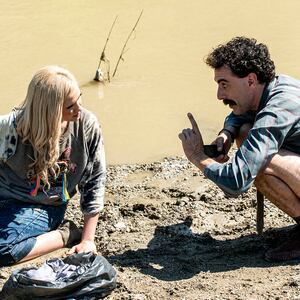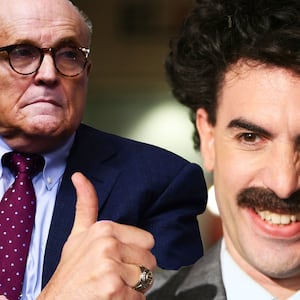When director Jason Woliner first received the encrypted script for a new, top-secret movie Sacha Baron Cohen was working on, the word “Borat” was nowhere to be found.
“Even if it leaked somehow, I think anyone would have been able to figure out that he probably wasn’t making a movie about a journalist from Guatemala named Alexi,” Woliner jokes on this week’s episode of The Last Laugh podcast.
For Baron Cohen to successfully pull off Borat Subsequent Moviefilm, he had to make sure nobody knew exactly what he was up to. And he wasn’t the only one in disguise. For the entirety of the nearly year-long shoot, Woliner assumed a secret identity, bleaching his hair blond to become “Chris,” the director of the fake documentary the crew told unsuspecting targets they were making.
“Sacha thought that I would come off as more trustworthy to the kinds of people we were filming with,” Woliner says. “I would look less coastal... less, uh, ‘globalist’ maybe.”
Woliner, a former child actor who grew up Jewish in the Bronx, got on Baron Cohen’s radar after directing some of the most ambitious episodes of Nathan Fielder’s similarly confrontational Comedy Central series Nathan for You. Before that he was a co-creator of the influential Human Giant sketch group, along with frequent collaborator Aziz Ansari, and a director on beloved comedy shows like Parks and Recreation, The Last Man on Earth, and What We Do in the Shadows.

And yet he had never directed a feature film when Baron Cohen approached him to helm the sequel to what Woliner calls the “funniest movie ever made.”
“I just came on really strong,” he recalls of their first meeting. “I was just very passionate about this. I was like, look, Borat is my favorite comedy. I think it’s the funniest movie ever made. It’s probably a mistake to do a sequel. There’s probably no way that this is going to be good.”
He was hired almost immediately and set out to prove himself wrong. The results, from a breakthrough, Oscar-worthy performance by newcomer Maria Bakalova as Borat’s daughter Tutar to newsmaking stunts at CPAC, a far-right militia rally, and Rudy Giuliani’s hotel room—much more on that below—speak for themselves.
“Even from the first meeting, Sacha was very determined that this be out before the election, that it make a statement about what America has become under Trump,” Woliner says of the film’s surprising political impact. Knowing how close the 2016 election was, he thought, “If people can see this and it motivates some people to go vote or motivates other people not to vote for Trump, that felt very meaningful.”
As for how he follows such an auspicious feature film debut, Woliner teases “another genre-jumping, hard-to-identify” script he has written about “small-town America” that Adam McKay has agreed to produce. He expects that movie will be “just as difficult, maybe more so” than the one he just completed, adding, “I think I’m just a glutton for punishment.”
Below is an excerpt from our conversation and you can listen to the whole thing—including a wild story about how “Chris” almost got beat up after the outrageous debutante-ball dance scene—right now by subscribing to The Last Laugh on Apple Podcasts or wherever you listen to podcasts.
How did you choose Rudy Giuliani as the big target for the climax of this movie? Because he’s always been relevant, but you couldn’t have known he would be as relevant as he was both leading up to and since the election.
No. And especially since. It was that crazy month after the election where it felt like he was almost trying to just do so many crazy things that people stopped talking about the scene in our movie. He was the name in the first script I got, so it was something on Sacha and the writers’ minds from the very beginning. We wanted to get someone in Trump’s inner circle. We talked about other ideas, but we always kept coming back to Rudy. And somehow right before the election, I think because he was this kind of hatchet man that was coming after Biden through the laptop and all that stuff, he became the big story. If anything, that scene shows how easy it was to get Rudy. It’s hard to imagine a time where he had any credibility, two months later, but it may have helped undermine him or at least just taken the wind out of the sails of what they were hoping was an October surprise.
I’m just fascinated by everything that went into getting Maria in the room with him. It seems like there’s a lot that we didn’t see in the movie. Because I know she did all this stuff, including posing as a conservative reporter and making a connection with OAN and Chanel Rion and then she was at the White House and all this stuff. Can you talk about what it took to get her in the room with Rudy?
It’s a very delicate process and we have an incredible team that figures out how to get people, both prominent people and regular people, and there’s different ways that they do it. It’s a little bit protected because to do this work again, they’re just very secretive about this stuff. But we did a lot of shooting, so the OAN stuff was something where we were saying, let’s see if we can get Tutar in the White House. Let’s just try it. And we had been able to make contact with OAN and we knew we had a window of time before Maria’s name would be public. You can’t go to the White House without giving your real ID. So we knew that Maria would not be able to do something like that for very long. OAN was extremely easy to hoodwink. They’re not a real news organization, they’re a propaganda organization. And so we got her into the White House with Chanel Rion, no COVID test required. And she was at a gaggle with Larry Kudlow and she was in the briefing room. And you could actually see—and I don’t think this was in the little clip that we put out—but that day, [Jared] Kushner was doing an interview on the White House lawn with Fox Business and you can just see Tutar, Borat’s daughter, wandering around in the background of the shot. And so it was one of those things we were just like, yeah, let’s send her in and see what we get out of it.
But it’s crazy that she got in the White House and that’s not in the movie. I think if you just told that to anyone without seeing the movie, they’d be like, “Wait, what? How does that not get in the movie?”
Yeah, it is crazy. When you put it like that, it’s pretty amazing we were able to get Borat’s daughter in the White House, in the press briefing room during a pandemic. We gave her a COVID test. And then a week later, I think it was a week after she was there, there was that first massive Rose Garden party outbreak, where everyone on staff caught COVID and just showed how insane the situation is there in terms of safety.
So back to Rudy. What did you think when you saw the footage of the two of them in the hotel room after the interview? Because there's been a lot of debate about what was happening in that scene.
Well, I was watching it as it was going. I was in a control room kind of hidden right there. And Sacha was hidden in a cubby that we had built into a little closet and he and I were texting because he couldn’t see what was going on. And so I was watching the feed. There were hidden cameras, obviously. So we’re unable to communicate with Maria, but we’re just trying to text with Sacha to determine when is the right time to jump out.
Yeah, like how far do you want this thing to go?
Right, because at a certain point it’s not funny anymore. It’s just a sting operation. So we’re texting with him, we’re watching. So they’re doing this interview. He’s saying all these shocking things about COVID and all this racist stuff about Chinese people. And then we have the first beat of it when Sacha comes in as the boom guy and that’s step one. There’s a chance, step one, he sees Sacha in what I think is the most absurd costume of the movie—it could blow up. Rudy could be like, what the fuck is that? And it doesn’t. If we just got that, we could maybe put something together. We didn’t want to just get that, but every step of the way is like, OK, let’s try it again. There was actually a beat that we shot where we pushed in a room-service tray and Sacha was hiding underneath it. We were doing this kind of farcical thing where he’s trying to communicate with her again and we wound up cutting it out of the movie. Again, Rudy didn’t discover anything weird, his radar didn’t go up.

Rudy Giuliani and Maria Bakalova in Borat Subsequent Moviefilm
AmazonMaybe not the most observant person.
Maybe not. But I will say, in person—I took him up in the elevator. I brought him into the room. I introduced them and I left. But you see him on TV and he looks so crazy. He was a lot more with it than I expected. He just seemed a lot sharper than we now imagine him to be. And then the interview happens and she’s talking about how nervous she is and how much she admires him. And then the interview winds down and they go into the bedroom. And of course there are no visible cameras in the bedroom. And then it’s really as you see it. He’s touching her shoulder, he’s asking for her number. He sits on the bed, he touches her lower back. And every moment of that we were watching thinking, “Oh my God, oh my God, oh my God.”
That’s what I was thinking watching the movie!
Yeah, imagine watching that in real life, a few feet away. And then he lies down and he puts his hand down his pants. My jaw hit the floor. It was one of those moments you never forget. And that’s when we said, “OK, Sacha, I think it’s time to go in now.”
So you didn’t buy the ‘I was just tucking in my shirt’ excuse?
You know, I’ve been doing this for a long time. I’ve seen a lot of people get microphones applied and removed. I’ve never seen anyone have to lie on a bed and put their hands down their pants.
That was the moment in the movie where I was just like, I cannot believe that they did this. It’s just insane.
That was pretty insane. And also, from a filmmaking perspective, what was most exciting to me about that was I’ve never seen anything like this in a movie where you’re taking basically a real-life villain and using them as the villain in a movie that they don’t know they’re in. And playing this scene that within the context of it, having watched the story, knowing what Tutar is going through, knowing that [Borat] is trying to prevent it from happening, doing this very romantic-comedy climax—doing all of that with a real person who doesn’t know they’re in a movie and is also someone that is one of the biggest figures in national news for an election that’s a week away, I was very excited to try to attempt that. And it was pretty fun.
Next week on The Last Laugh podcast: Stand-up comedian and SNL alum Colin Quinn.



